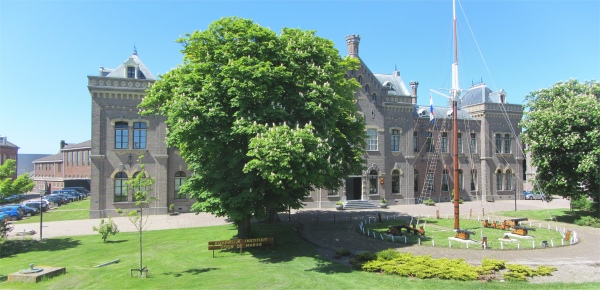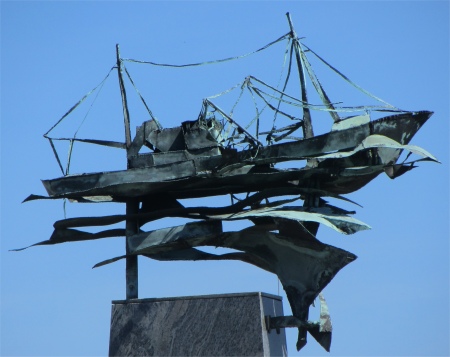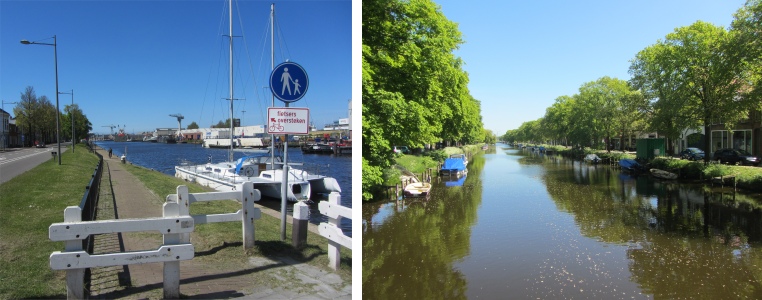2nd June
Rex took the midnight to 4am watch, and when I awoke, I found a pearly grey dawn with the promising flush of a beautiful sunrise in the east. The East Anglian coast had slipped off the horizon behind us. Occasionally a fulmar effortlessly glided about Duonita before losing interest in us. Almost gull-like, these grey and white seabirds are related to the albatrosses. They fly low over the sea on stiff wings, with shallow wing beats, gliding and banking to show their white under parts then grey upper parts. I appreciated their company on my lonely watch. A few large ships passed by, heading to exotic locations such as Mistley, Tilbury, Dunkerque and Le Havre.
But the piece de resistance of this early morning watch was watching a tiny bead of red suddenly float up on the horizon directly ahead, as the sun heaved its massive weight up to plop onto the grey horizontal line for a rest before beginning its long steady ascent into the heavens. Such a sight never fails to fill me with awe. The sun felt warm on my face, and once again I revelled in the magical joy of a long sea passage.
The day passed by in a blur; it always takes me a while to fit into a 4 hour on/4 hour off watch routine. The sky was blue, the wind not favourable, and the sea decidedly lumpy, so much so that I decided not to eat. I wasn't feeling sea sick, I just had no appetite. Rex meanwhile made endless supplies of cups of tea and coffee; he would drink more in an hour than I would in a day. Soon our paths only crossed at watch changes; one man taking over while the other grabbed rest in his bunk or pit. My pit was a coffin type arrangement which I had to slide into, though my upper body was not buried. It was a cosy arrangement, which served to ensure I would not fall out of my pit in rough seas.
The monotony of the cold grey expanse of the North Sea was broken by the plentiful supply of ships plying their way between places as far apart as Klaipeda and Nantes.
As we neared the Dutch territorial waters, fishing vessels became a nuisance (they need to be given a wide berth because of the long line of nets extended behind them), and fields of oil and gas rigs gathered, standing like Martian sentinels left over from the War of the Worlds.
The sun sank below the horizon, and a bitterly cold wind still raced across the icy, grey waters, lashing up a swell that occasionally thudded into Duonita, sending a shudder from bow to stern. We picked up a shipping forecast which announced that the gale warning had been cancelled. Hmmm..... we weren't expecting that.
Darkness enveloped us, and we were surrounded by a magical world of flashing buoys and beacons, plus the steady cluster of lights of large vessels. Oil rigs, lit up like enormous Christmas trees, came and went.
3rd June
I went off watch at midnight, and snuggled in my pit under my sleeping bag, soon oblivious to it all. This wasn't to last. Around 02:30, I was woken by Rex, we were now in the Schulpengat, the approach channel to Den Helder. The poor lad related to me the traumas he had experienced over the last half hour. "Three dredgers came out of Den Helder and blocked off the channel. Then, to cap it all, what seemed like the entire Den Helder fishing fleet all poured out following their customary practice of ignoring non-fishing vessels." Strong coffee was required at this point. Curiously, Rex had the ability to curse and smile at the same time; he saw the funny side of such calamities.
We gingerly made our way along the channel on the approach run into Den Helder, passing by a very large, unlit buoy in the murky darkness, and gilled about outside Den Helder harbour. The guide book we were using proved as effective as a chocolate teapot as far as guidance was concerned. "Look for the lit tower with a ring of lights," it said - we were confronted with what looked like a New York skyline lit up like Blackpool illuminations. "Do any of these guide writers actually visit the places they write about?" quipped Rex. Our aim was to moor up in Koninklijke Marine Jacht Club just inside the harbour, but first we had to seek VTS Den Helder's permission to actually enter the harbour (we learned later just how busy the harbour is, and hence the need to seek permission to enter and leave). A quick chat with VTS Den Helder indicated that we were free to enter the harbour, and tie up in the marina where we could.
Once in and safely moored, we enjoyed a cup of tea and a wee dram of Jura before settling down for some sleep at 4am.
I was up by 09:30 and sought out the marina harbour master, who turned out to be a friendly young lad in his late teens, tall like most Dutch people, and totally laid back. "Since you didn't arrive until early in the morning, there is no charge for last night," he said in impeccable English.
A leisurely breakfast was followed by checks on the boat, accompanied by singing, "Do the checks, Rex", sung to the tune of that old song, "Hit the Road Jack". Rex just loved that singing! A delicious shower managed to give our day a proper kick start and activated us to take a walk into town.




